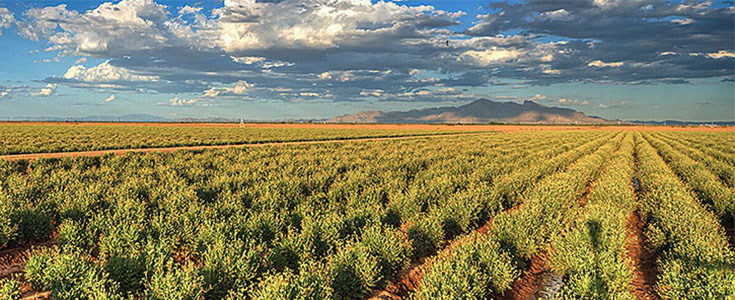The Jordan College of Agricultural Sciences and Technology
Guayule - the Miracle Crop
By Ivana Garcia, Ag Education 166 (Ag Publication Production - Spring Semester 2020)
Parthenium Argenteum, or guayule (/waɪˈuːleɪ/) is a shrub native to southwestern United States, and Northern Mexico. Three years ago in Parlier CA, the USDA Agricultural Research Station partnered with Fresno State under the funding of ARI (Agricultural Research Initiative) to learn more about guayule, and why it could possibly become a booming cash crop that California can greatly benefit from.
What makes this plant so interesting?
During the interview with Dr. Todd Lone, a campus agricultural business faculty member, he states a great deal of reasons: it's drought tolerant, can grow in harsh conditions, contains a natural pest repellent, it’s a low input crop, easy to harvest and finally; guayule can morph into many value added products such as hypoallergenic latex, rubber, and biofuel.
Value added = added money.
It is no secret that in California, good quality water is not always readily available, and in some regions, soils are so depleted after they become heavily saturated in salt, boron and minerals. This makes growing anything almost impossible; however, this is where guayule thrives.
Studies out at the USDA Research Station are finding that the quality of the resin extracted, and stem structure is not affected at all by harsh soil conditions.
 “It looks like we’re not seeing the boron going out into the leaf structure which
is a positive and it doesn’t seem to translocate the salt among the plant.” Dr. Lone
stated.
“It looks like we’re not seeing the boron going out into the leaf structure which
is a positive and it doesn’t seem to translocate the salt among the plant.” Dr. Lone
stated.
“Typically, you plant these and you’re going to have your first harvestable crop probably somewhere between 2 or 3 years later. Then you cut it down to about ground level, and then it takes about 18 months to regenerate where you’d be able to re-harvest it again. Some studies are showing that they’re getting about 10 years of growth out of it, some 12.”
Harvesting guayule is just swathing, baling, and storing it with minimal damage. Dr. Lone also states that guayule can “keep” for years before having to extract the resin. The final question would then be if there’s a demand for this plant.
The answer according to Dr. Lone is yes:
“We definitely have the demand for it," said Lone. "The U.S. demands and imports a tremendous amount of rubber every year. If we can supply that and not be as reliant on other parts of the world, that’s always a good thing.”
Companies such as Bridgestone Tires have partnered with several universities to attempt to make natural rubber tires that are American made and good for the environment. The medical field also shows a great deal of interest since 19 million Americans are allergic to latex.
The natural rubber market in the U.S. is valued at $40 billion, with over 12 million tons being produced globally every year.
